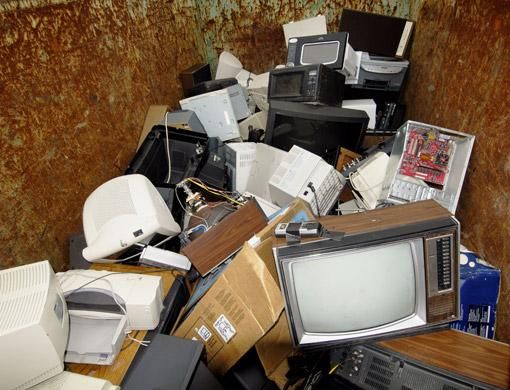While most household appliances last for years, what do you do when the time comes to replace them? Merrily trashing them isn't the answer — instead be kind and give them a green end.
There are several ways to go 'green'. From recycling old newspapers to donating used clothing and furniture, there is a way to can reuse just about everything, and in turn protect the environment. But while newspapers, clothing and furniture come to our mind almost instantly, many of us never give a second thought to old household appliances. Nine out of ten times we dump that outdated or worn-out appliance instead of safely disposing or recycling it.
As owners of televisions, washing machines, refrigerators and air-conditioners, we play a critical role in helping to protect against environmental hazards associated with appliance disposal.
Appliances like refrigerators, air conditioners, and dehumidifiers all contain dangerous refrigerants such as Freon, which can deplete the ozone layer if not properly disposed of.
Waste management
In order to protect the health and safety of its residents and the environment, the Dubai Municipality has a Bulky Waste Collection Service that helps to get rid of home appliances such as refrigerators, TVs, and washing machines. According to Hassan Mohammed Makki, Director of the Waste Management Department, Dubai Municipality, "The Dubai Municipality is inviting scrap companies to submit tenders that are part of the strategy to enhance private participation in solving waste problems. The question whether it is recyclable waste or not depends on how the scrap companies retrieve the useful parts for reuse and reselling purpose. What is important is that we are being able to prolong the use of landfill, minimise waste and ensure the health and safety of Dubai residents."
Toxic substances
Bulky waste, Makki says, not only defaces the general appearance of the place we live in, but also contains toxic substances that have an adverse impact on health and environment. Computers, for instance, contain highly toxic chemicals such as lead, cadmium, mercury, polyvinyl chloride and phosphor compounds.
"Each one of us has a role in recycling used appliances. Residents must donate or resell old appliances for reuse. This will extend the life of a valuable product and keep it out of the waste management system for a long time. Public participation is important for us to achieve better ways in recycling such types of waste," says Makki.
Gaurav Malaviya, Head of Marketing and Buying, Plug-Ins, one of the UAE's multi-brand electronics retailers, says that computers and television screens should never be thrown away casually because they contain cathode ray tubes. "Inside the cathode ray tube there is lead, which is toxic and is capable of poisoning the air and water and harming people and animals.
"Unsupervised methods of removing metals from computers and other electronics can result in lead, mercury and other chemicals being released into the atmosphere."
The Go-Green campaign launched by Plug-ins urges customers to take their old mobiles and laptops to any Plug-ins store in the UAE and receive a special certificate of appreciation and a surprise gift. "Plug-ins is working with Dubai Municipality and the collected items are delivered to them to be disposed of under strict government guidelines," says Malaviya.
Garbage goes green
In Japan the Home Appliances Recycling Law came into effect in April 2001. It was created to give a new life to items such as television sets, air conditioners, refrigerators and washing machines (usually thrown away as bulk waste) through the recycling plants of manufacturers. These four categories, of product, were chosen because they contain a large volume of useful materials such as steel, copper, aluminium and glass.
Spurred by the increasing quantity of electric appliances in Japan's municipal waste stream and the lack of adequate processing capacity for these waste products, the law was a major step towards producer responsibility.
The law requires manufacturers and importers to collect and recycle their own appliances and specifies that manufacturers have individual responsibility for their products. The volume of end-of-life products such as televisions, air conditioners, refrigerators and washing machines recycled in Japan ris 12.01 million annually.
The Panasonic Eco Technology Centre (PETEC) is one such recycling plant in Japan that makes use of the many types
of glass, metals and plastics found in end-of-life products. At Petec, a broken TV is not just garbage because the materials the television is made from, such as glass and metal, are resources that can be used again. Petec removes these recyclable materials from end-of-life products and uses them as materials to produce new products.
Improving recycling technology Petec focuses on researching and developing new recycling technology. In addition, the knowledge gained at the recycling site is shared with the research and development department of Panasonic and its group subsidiaries, and this knowledge acts as feedback to design new products. The Sanyo Group in Japan also collects and recycles used product units of the four specified items under the Home Appliances Recycling Law.
Today, there is a need to create a recycling-oriented society to carefully make use of limited global resources. So next time you're thinking of throwing out your freezer or television, make sure you stop and think about the safest and friendliest way to do so.
Appliance disposal: Things to remember
If you're updating your home and have decided to
buy new appliances, the first thing you should do is call your electric utility and see if they offer a bounty programme in your area. These programmes can give you a rebate for your old, unwanted appliances.
You can also try to arrange an appointment with
your municipality to have your appliance picked up
or to find out where you can take them to be disposed. (The Dubai Municipality Toll Free number is 800 900)
Do not attempt to remove refrigerant or compressors yourself. Improperly handled refrigerant may result in physical harm. While disposing of a refrigerated appliance, try to enquire about the disposal practices of the entity removing your unit to ensure that it will be disposed of responsibly.
— Courtesy: US Environmental Protection Agency











